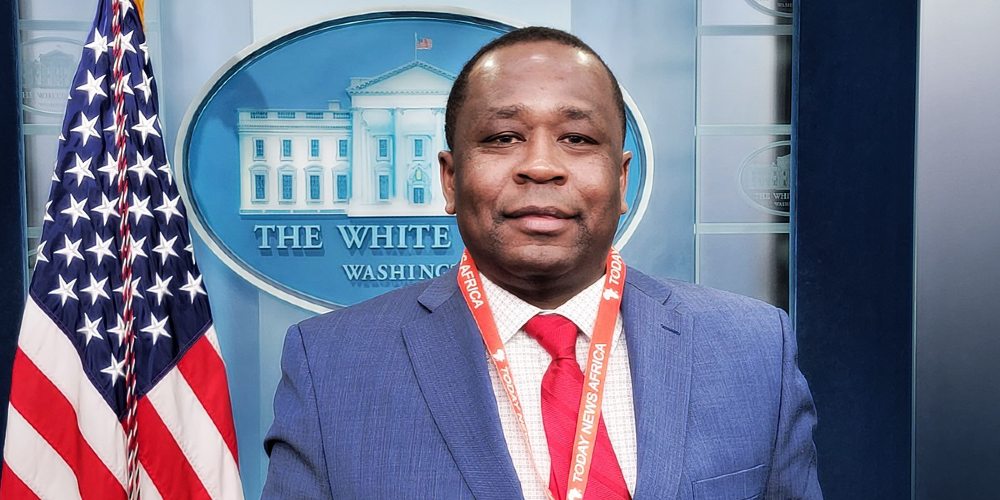![]() The Washington Post published an article Saturday ripping Simon Ateba, a black reporter known for his criticisms of the Biden White House’s press customs and its press secretary, Karine Jean-Pierre.
The Washington Post published an article Saturday ripping Simon Ateba, a black reporter known for his criticisms of the Biden White House’s press customs and its press secretary, Karine Jean-Pierre.
Ateba, the subject of the Post’s piece and a reporter for Today News Africa, has frequently accused Jean-Pierre of deliberately not calling on him during White House press briefings since she assumed the position from Jen Psaki in May 2022. Ateba is a consistent challenger of White House narratives, and often engages in arguments with Jean-Pierre when she ignores his questions or does not call on him during briefings.
The Post’s headline reads “Simon Ateba, the reporter making himself the story at the White House,” while the body of the article calls into question Ateba’s motivations for engaging in conflict with White House press officials, trivializing Ateba’s journalistic interests and portraying him as an attention-seeker.
“[I]t’s not really clear what questions Ateba has been seeking to ask,” the article reads. “His serial interruptions typically begin and end with a protest about how the press secretary hasn’t allowed him to ask his question.”
Ateba’s journalism frequently focuses on White House press officials. For instance, in April 2022, Ateba asked then-press secretary Jen Psaki whether Biden blamed her for his low poll numbers.
Ateba directly challenged White House’s vague answers to questions regarding the origins of COVID-19 in November 2022, and he criticized the Biden administration’s “rigged” press conferences when he alleged that Biden’s staffers only call upon a list of previously-vetted reporters for questions during live briefings that same month.
Simon Ateba Dives Into Conflict With Jean-Pierre https://t.co/O5Ct0BYGth
— Daily Caller (@DailyCaller) December 31, 2022
Ateba also accused the White House of intentionally scrubbing footage from a June 27 White House briefing in which he scrapped with Jean-Pierre. The White House blamed a technical glitch for the loss of the exchange from the official recording, which was later fully restored, according to Fox News.
After admonishing Ateba’s behavior, the Post article describes a White House rule proposal pertaining to professional conduct of journalists who attend White House briefings.
“[The rule proposal] said those in violation of the proposed standard would be warned at first, followed by revocation for repeat offenses,” The Post wrote.
This proposed set of rules, the Post asserted, could give the Biden White House the mechanism it needs to legally bar Ateba from briefings. Such an expulsion would stand in contrast to the Trump administration’s expulsions of unruly reporters, such as Brian Karem and CNN’s Jim Acosta, the Post asserted.
“Courts quickly restored (Karem’s and Acosta’s) access, ruling that the White House lacked any formal standards or process for barring credentialed journalists,” the Post noted of the two reporters who consistently challenged the Trump administration’s preferred narratives.
Ateba told The Post that his efforts to cover the White House “have been met with racism and discrimination from the Left, as well as misleading articles that fail to address the underlying story of discrimination against me.”
The Washington Post did not respond immediately respond to the Daily Caller News Foundation’s request for comment.
All content created by the Daily Caller News Foundation, an independent and nonpartisan newswire service, is available without charge to any legitimate news publisher that can provide a large audience. All republished articles must include our logo, our reporter’s byline and their DCNF affiliation. For any questions about our guidelines or partnering with us, please contact licensing@dailycallernewsfoundation.org.
- Gold SKYROCKETED during Trump’s first term and is poised to do it again. Find out how Genesis Precious Metals can help you secure your retirement with a proper self-directed IRA backed by physical precious metals.




A black lesbian won’t allow a straight black man to speak. Isn’t that heterophobic?
He’s African, so he’s not sold out to the US media group think. Let’s bring foreign reports to the US to ask the questions American reporter wouldn’t ask.
WaPo is something I’d line the cat box with. What they call journalism is a bunch of useful idiots in a cult who support O’Biden under any and all circumstances. I’ve got more respect for the National enquirer. At least the get it right every once in a while. Guessing the Fed is paying WaPo for their “services”.